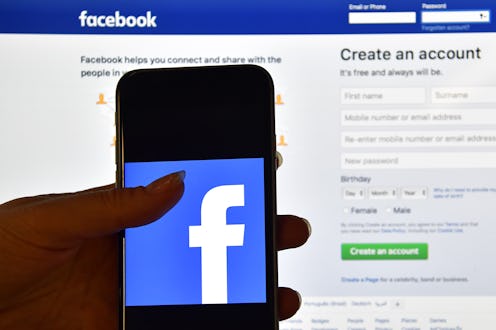News
Facebook "Shadow Profiles" Sound Sketchy As Hell — Here's What You Need To Know

Mark Zuckerberg resumed his two-day congressional hearing on Wednesday, returning to Congress to testify on Facebook's mishandling of user data in the Cambridge Analytica scandal. One remark from the social media network CEO has left many wondering: What exactly are shadow profiles on Facebook?
The concept of Facebook keeping shadow profiles on people has been around for a while, and there has been extensive reporting on the matter. Essentially, shadow profiles are profiles that Facebook builds independently of your actual profile that you create on the website, with information about you picked from Facebook users, as well as other third parties.
What this means is that even if you don't have a Facebook account, the website will create a "shadow" based on data that others have about you — and there is reportedly an option to opt out of this. How Facebook does this is by encouraging users to upload their contacts to the system to use its "Find Your Friends" feature, as well as obtain data about people from data brokers, which are companies that collect and analyze some of your personal information, and then sell it to other companies.
Shadow profiles on Facebook are reportedly part of what feed its "People You May Know" feature, where it suggests people for you to befriend. (If you've ever wondered why that person on Tinder is suddenly on your "People You May Know List" after you've exchanged numbers with them, these shadow profiles might be the answer to that.)
According to the website Boing Boing, Facebook accidentally leaked its users' shadow profiles to them in 2013, practically confirming that this practice exists. On Wednesday, however, Zuckerberg claimed that he's "not familiar" with shadow profiles.
Rep. Ben Lujan, a Democrat from New Mexico, asked Zuckerberg whether Facebook "has detailed profiles on people who have never signed up for Facebook." In response, Zuckerberg said, "In general we collect data on people who have not signed up for Facebook for security purposes."
Then Lujan went straight to the point. "So these are called shadow profiles, is that what they’ve been referred to by some?" he asked. To which Zuckerberg replied, "I’m not — I’m not familiar with that."
Lujan also asked "how many data points" Facebook has on each user, and the CEO said he did not know "off the top of his head." Lujan replied:
You said everyone controls their data. But you are collecting data on people that are not even Facebook users, that have never signed a consent or privacy agreement. When you go to Facebook's "I don't have a Facebook account page and would like to request all my personal data stored by Facebook," it takes you to a form that says go to your Facebook page and then on your account settings you can download your data. So you’re directing people that don’t even have a Facebook page to sign up for a Facebook page to access their data.
If the idea of a powerful social media network collecting information about you through other people without your consent or knowledge sounds sketchy to you, you're not the only one. In its effort to "connect the world," Facebook appears to have done a whole lot of stuff with your data that is only now becoming more widely known.
As evidenced on Wednesday, Zuckerberg and other Facebook employees are no fans of the sinister term "shadow profile." But whether or not they will acknowledge familiarity with the term, Zuckerberg's congressional hearing this week might just be the first glimpses of what Facebook is actually doing with your data behind closed doors.